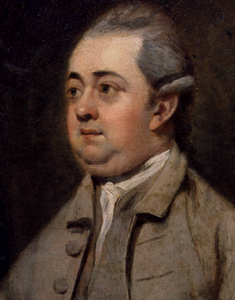Edward Gibbon
1737 - 1794
The Author
Edward Gibbon, historian of the Enlightenment, scholar and Member of Parliament, was born in 1737 in Putney in South London into a prosperous family. After the death of his mother his father left the son to the care of an aunt. Gibbon was a sickly child and his education at Westminster School and at the University of Oxford was irregular. After his conversion to Roman Catholicism in 1753 he was removed from Oxford and sent by his father to Lausanne, Switzerland, where he lived under the care and tutelage of a Calvinist pastor. He reconverted to Protestantism and wrote: «The articles of the Romish creed disappeared like a dream». He remained in Lausanne for five intellectually productive years. Here he fell in love with Suzanne Curchod, the daughter of a clergyman, who afterwards became the wife of Louis XVI's finance minister Jacques Necker, and the mother of Madame de Staël. The relationship was ended by his father, and Gibbon remained unmarried for the rest of his life. «After a painful struggle I yielded to my fate: I sighed as a lover, I obeyed as a son.» From 1759 to 1762 Gibbon hold a commission in the Hampshire militia. In the following year he visited Rome, on his «Grand Tour» through continental Europe. And it was here that Gibbon first had the idea of composing a history of the city: «as I sat musing amidst the ruins of the Capitol, while barefoot friars were singing vespers in the Temple of Jupiter, that the idea of writing the decline and fall of the city first started to my mind». In 1776 the first volume of «The History of the Decline and Fall of the Roman Empire» was published. It was a great success. Volumes II and III appeared in 1781, volumes IV, V, and VI in 1788, written in Lausanne. «It was on the ... night of the 27th of June, 1787, between the hours of eleven and twelve, that I wrote the last lines of the last page in a summer-house in my garden. ... I will not dissemble the first emotions of joy on the recovery of my freedom; and perhaps the establishment of my fame. But my pride was soon humbled, and a sober melancholy was spread over my mind by the idea that I had taken my everlasting leave of an old and agreeable friend.» The last years of his life were overshadowed by illness. He died in London in 1794, at the age of 56. Gibbon's masterpiece with its open denigration of organized religion was strongly criticized by Christian authorities and was banned in several countries.
Edward Gibbon
The Works
Essai sur l'Étude de la Littérature (1761) >>> Critical Observations on the Sixth Book of [Vergil's] 'The Aeneid' (1770) >>> The History of the Decline and Fall of the Roman Empire (1776 - 1788) A Vindication of some passages in the fifteenth and sixteenth chapters of the History of the Decline and Fall of the Roman Empire (1779) >>> Mémoire Justificatif pour servir de Réponse à l'Exposé, etc. de la Cour de France (1779) >>> Justificatory Memoir >>> Antiquities of the House of Brunswick (1790) >>> Memoirs of my Life and Writings (1796) A Dissertation on the Subject of the Man with the Iron Mask >>> An Adress >>> Correspondence >>>
Appendix
Edward Gibbon (Wikipedia) Essai sur l'Étude de la Littérature (german translation, 1792) The History of the Decline and Fall of the Roman Empire (german translation, 1800) The History of the Decline and Fall of the Roman Empire (german translation, 1837) Memoirs of my Life and Writings (german translation, 1796) |

